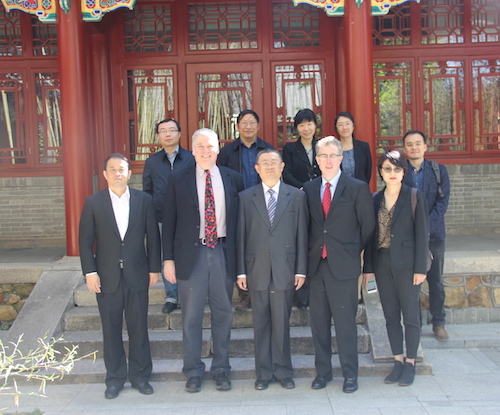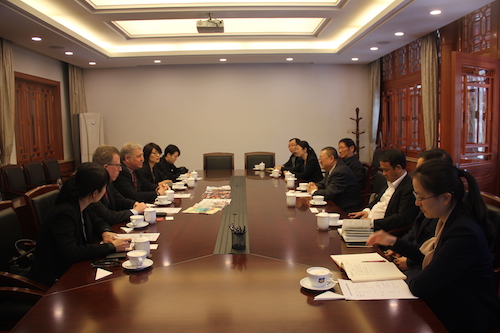On April 18, 2017, the editor-in-chief of the journal Science, Jeremy Berg, and the publisher of AAAS/Science, Bill Moran, visited Peking University (PKU) to examine the status of scientific research at the university. The PKU hosting delegation included University Vice President Wang Jie, Director of the Office of Scientific Research Zhou Hui, along with other representative faculty working in the fields of material sciences, life sciences, and information sciences. After the meeting, the team from Science toured PKU's facilities and heard more about specific research being conducted. As such, the meeting primarily consisted of both parties affirming areas of commonality with regards to both challenges faced and shared visions for the future. The meeting then concluded with a discussion of platforms for cooperation moving forward.

Mr. Wang opened the meeting by discussing PKU's emphasis on promoting new teaching methods focused on cross-disciplinary scientific research. The other faculty from PKU, in briefly introducing the work they do, also affirmed their commitment to engage in this type of inquiry, particularly in cooperating with others. As an example, the PKU team pointed to the joint center for life science research between PKU and Tsinghua University. From the perspective of leading an academic journal, Mr. Berg affirmed that, “inter-disciplinary scientific research is both exciting and challenging.” While it does foster and promote innovation, he also admitted that it can also be hard for an editor to categorize it according to the traditional disciplinary boundaries.

Another theme that arose during this meeting revolved around the challenge of funding. While acquiring government funding for constructing facilities is relatively easy, Prof. Zhou pointed out that it is harder to maintain funding for operating costs, including funds for researchers. Mr. Moran agreed with this assessment and shared how similar difficulties exist for scientists in the United States. Interacting with policy-makers in this regard often requires developing an impact evaluation system so as to track what types of research papers result in actual patents. The team from Science asked PKU if such a system existed in China, to which they answered yes.
Last, but certainly not least, both parties emphasized a common vision for the future that consisted in investing in young people. Looking at China's efforts to support aspiring young scientists, such as the ten-thousand talents program, Mr. Moran said that he can clearly see that it has made a “big, big difference.” Both parties recognized a need to integrate the “old system” and “new system” in China, not just with regard to scientific research.
This shared commitment and vision flowed into a discussion on how to build on platforms of cooperation in the future. Mr. Wang mentioned that next year is going to be PKU's 120th Anniversary and hopes to find a way to cooperate with Science in this celebration. Agreeing to this proposal, Mr. Berg offered that Science could conduct workshops and career talks for young people at PKU.
Author: Joshua Pine
Editor: EAS



